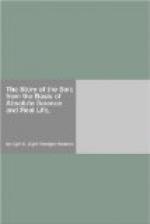“However,” Percy resumed, “if you should decide to dispose of about half of that seven hundred acres which you use only as a safety bank for most of your two hundred dollars in taxes, please consider me a prospective taker.”
“Take her,” said Mr. Thornton, and again confusion reigned.
“Tom is so anxious to get rid of his sister-in-law that he reminds me of the man whose mother-in-law died,” said Miss Russell. “He was too far from home to return to the usual funeral, and they telegraphed him the sad news and asked if they should embalm, cremate, or bury the remains. He wired back: ’Embalm, cremate, and bury’”
“That matter of outside capital is by no means so substantial as it might seem,” said Percy. “It is worth while to consider how little real wealth there would be in America if the remaining rich lands should become impoverished. The railroads would at once cease to pay dividends, and those who are now millionaires in railroad stock would find themselves on the rapid road to poverty. The manufacturer of finished products from the raw materials raised on the farm, the manufacturer of agricultural implements, and the great urban population whose income is from the trade in raw materials and manufactured goods would soon see their wealth shrivel. The great sky scrapers of the cities would be left for the owls and bats to harbor in, if our agricultural lands ceased to yield their great harvests. Meanwhile the farming people would continue to live upon the meager products still produced from the impoverished soil, even though they had no surplus food to ship into the cities. Human labor would replace that of domestic animals on the farm, just as it has done in China and India, in part because man’s labor is worth more than that of the beast, when measured only by the amount of food consumed, and in part because a thousand bushels of grain will support five times as many people can be supported for the same time upon the animal products that could be produced by feeding the grain.”
“Oh, that is such a gloomy view to take of it,” said Miss Russell.
“And all the world loves an optimist,” replied Percy laughingly. “Soils do not wear out; there is no poor land; the farms are better and the crops larger than ever before; and we are the people of the world’s greatest nation, with an assured future glory which surposses all conception.”
“As soon as we get the canal dug,” suggested Mr. Thornton.
“Yes, we will surely be able to dig that Panama ditch,” said Percy; “and probably our resources will last to cut a gash or two in our own interior, if we don’t build too many battle ships. You know Egypt built three great pyramids before her resources became reduced to such an extent that the people required all their energies to secure a living.”
CHAPTER XVII
MORE PROBLEMS




